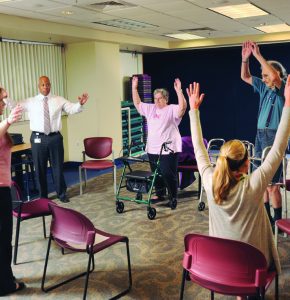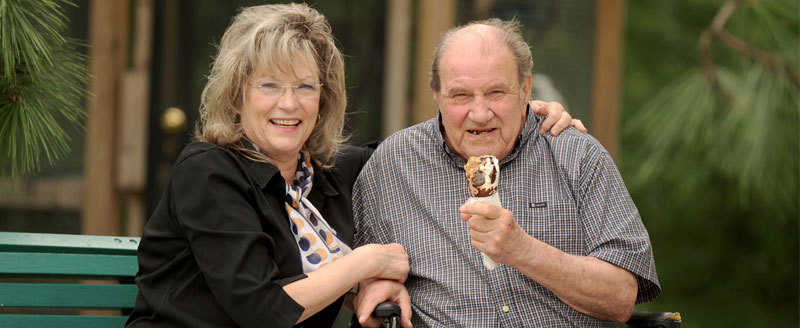Multidisciplinary Approach Benefits Aging Bodies and Minds
Americans are living longer and healthier lives. Even so, many older adults will eventually develop one or more of a group of related medical problems called geriatric syndromes. These syndromes can limit older adults’ abilities to carry out basic daily activities, threaten their independence and lower their quality of life.
“Geriatric syndromes usually have more than one cause, and don’t necessarily involve just one organ system,” explains George Hennawi, MD, chief of Geriatrics at MedStar Good Samaritan Hospital and director of the Center Hughes and his wife, Sharon, are grateful for the comprehensive care available at the Center for Successful Aging. “For these reasons, providing care to older people with geriatric syndromes can be complicated. Geriatricians and other geriatric healthcare providers can play an important role in diagnosing and managing these syndromes.”
The Center for Successful Aging is dedicated to addressing the unique needs of people experiencing complex medical and social age-related conditions, providing patient-centered care— care that is comprehensive and coordinated among doctors, nurses, therapists, and other caregivers—all in one convenient location.
Robert Hughes, a patient of the Center for Successful Aging, epitomizes the type of individual who benefits most from the multidisciplinary care offered. The 81-year-old has chronic obstructive pulmonary disease, high blood pressure and suffers from anxiety and depression. Two years ago, he was diagnosed with dementia, one of the most common and complex geriatric syndromes, according to Dr. Hennawi.
“Cognitive disorders, such as Alzheimer’s disease and other types of dementia, cause the loss of cognitive function, which affects one’s memory, judgment, processing, attention span, mood and ability to complete basic daily functions,” Dr. Hennawi says. “In the case of vascular dementia—the type of dementia Robert has—the sense of balance is also affected, making walking difficult.”
For patients with complex forms of dementia and neuropsychiatric complications such as agitation, aggressive behavior or wandering, the center collaborates with the Cognitive Wellness Program to provide them with the specialized care they need.
“The goal of the Cognitive Wellness Program is to further enhance the coordination of care in the elderly,” says Elias Shaya, MD, DFAPA, regional medical director, Behavioral Health Services, MedStar Health. “Older folks who struggle with cognitive challenges almost always end up with neuropsychiatric problems making it difficult to navigate daily life.”
 Patients at the Center for Successful Aging receive regular health assessments to identify both medical and cognitive function issues and determine if they are at risk for other conditions or in need of more specialized treatments. Cynthia Fields, MD, a geriatric neuropsychiatrist at MedStar Good Samaritan, is part of the assessment team.
Patients at the Center for Successful Aging receive regular health assessments to identify both medical and cognitive function issues and determine if they are at risk for other conditions or in need of more specialized treatments. Cynthia Fields, MD, a geriatric neuropsychiatrist at MedStar Good Samaritan, is part of the assessment team.
“Evaluating them while they are in familiar surroundings at the Center for Successful Aging is much easier for both the patient and the family,” says Dr. Fields. “If the patient clearly needs specialized care, the individual is referred to our Cognitive Wellness Program.”
While at the Center for Successful Aging, the needs of caregivers, who are often overwhelmed—physically and mentally—by the responsibilities of caring for their loved ones, are an important consideration, too. “We offer a wide range of resources and educational support to help families and caregivers better understand and cope with the situation,” Dr. Fields adds. Sharon Hughes, Hughes’ wife and caregiver, is grateful for the coordinated and comprehensive care available at the Center for Successful Aging. “Now that Robert needs to use a wheelchair because of his dementia, just getting ready for a doctor’s appointment is a challenge,” she says. “Going to the Center for Successful Aging is much more convenient for us … everything we need is there.”
“Many people who are developing or have dementia are not diagnosed. Early signs of serious problems are easy to miss. Unfortunately, the failure to evaluate memory or cognitive complaints often hinders the treatment of other underlying diseases and conditions,” Dr. Hennawi notes. “That’s why integrating medical and behavioral care is so essential to this population.”
For more information about the Center for Successful Aging and the Cognitive Wellness Program, call 410-248-8322.

